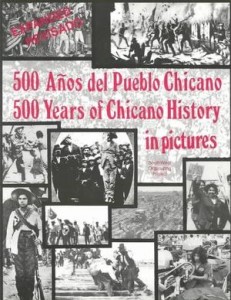A federal judge ruled yesterday that Arizona’s ban on ethnic studies curricula is both unconstitutional and designed with discriminatory intent. Judge A. Wallace Tashima has not yet issued a final ruling on the next steps, but academic freedom advocates are hoping the law will be struck down, paving the way for the return of Tucson Unified School District’s highly successful Mexican American Studies program.
At issue in the case was a state law enacted in 2013 that was specifically designed to target Tucson’s MAS program. The law made it illegal to teach classes that “promote resentment toward a race or class of people” and “are designed primarily for pupils of a particular ethnic group.” Despite independent audits of the program, which found that it didn’t violate the law and in fact improved student performance, the district was forced to shut down the MAS program or face a loss of funding. Several books by Mexican American and Native authors were seized from classrooms.
In a preliminary ruling yesterday, Judge Tashima found that the law violated students’ First Amendment right to receive information and their Fourteenth Amendment right to equal protection. For evidence of discriminatory intent, he was able to draw on vitriolic blog comments against the program that were originally posted anonymously but later found to have been posted by Arizona superintendent of public instruction John Huppenthal while he was in office. Among other things, the comments “called for the elimination of Spanish from public life, with the exception of a limited number of words on Mexican restaurant menus, and compared Mexican-American studies teachers to the Ku Klux Klan.”
Tashima noted that the comments “convey animus toward Mexican-Americans generally,” and that Huppenthal and his predecessor Tom Horne both “were pursuing these discriminatory ends in order to make political gains,” using the law for a boost in their respective campaigns. The strategy was successful in the short term, but Huppenthal ultimately was defeated in a 2014 Republican primary by Diane Douglas, who went on to win the general election and remains the current superintendent.
CBLDF was among several organizations that condemned the dissolution of the MAS program in 2012, and we also joined a Freedom to Read Foundation amicus brief in the case the following year. We are cautiously optimistic in light of Judge Tashima’s preliminary ruling, but we’ll hold the celebrations until we see what remedy he proposes in the coming weeks. Stay tuned!
Catch up on our previous coverage of the MAS ban below:
- Hearings Begin for Tucson’s Embattled Mexican American Studies Program
- Ninth Circuit Court Finds Constitutional Problems with AZ Law that Censored Mexican American Studies Program
- CBLDF Joins Amicus Brief Opposed to Arizona Law that Led to Ban of Mexican American Studies Books
- TUSD’s Lift of Book Ban Draws Ire of Arizona Department of Education
- Tucson School District Lifts Ban on Mexican American Studies Books
- Embattled Mexican American Studies Program Finds Another Way
- Court Upholds Law that Led to Tucson Book Ban
- Move by Tucson School Board May Mean Overturn of Book Ban
- Effort to Return MAS Books to Classrooms Fails in Tucson
- Tucson School District Blocks Renowned Chicana Author’s Visit
- Protestors Take Over Tucson School Board Meeting
- Tucson School Board Tightens Security
- Latino and Native Authors Keep Tucson Book Ban in the News
- Why Tucson Matters
- CBLDF Joins National Organizations in Condemning Arizona School Censorship
Help support CBLDF’s important First Amendment work in 2017 by visiting the Rewards Zone, making a donation, or becoming a member of CBLDF!
Contributing Editor Maren Williams is a reference librarian who enjoys free speech and rescue dogs.
